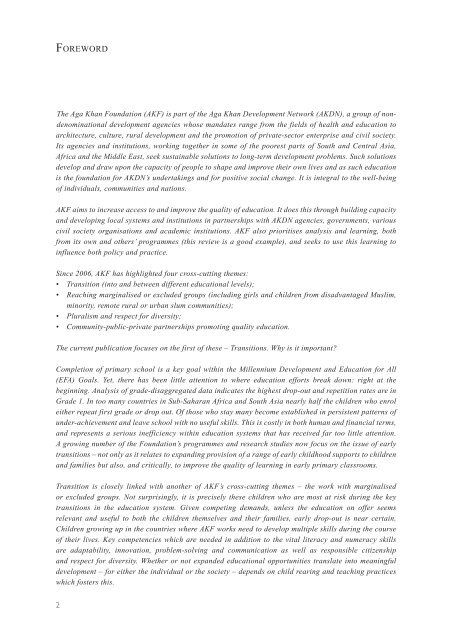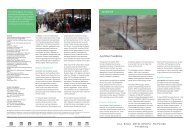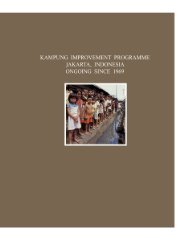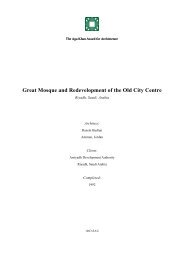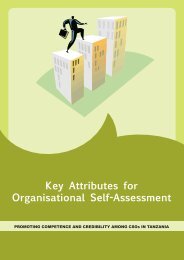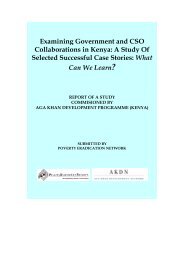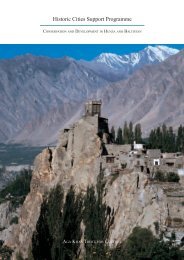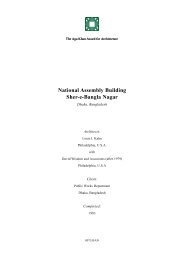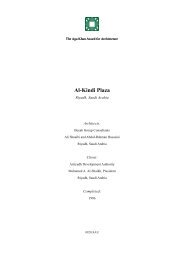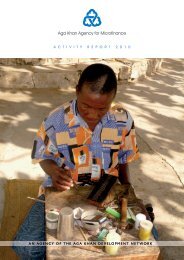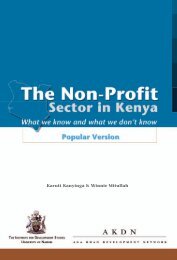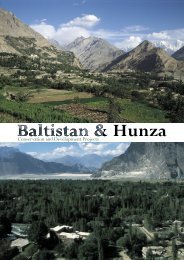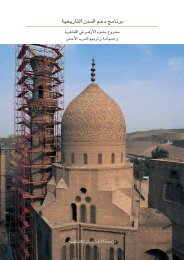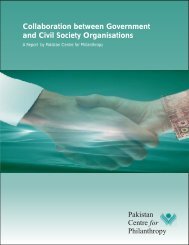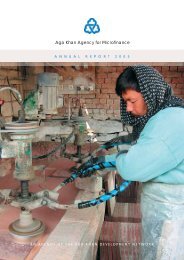Improving Learning Achievement in Early Primary in Low-Income ...
Improving Learning Achievement in Early Primary in Low-Income ...
Improving Learning Achievement in Early Primary in Low-Income ...
Create successful ePaper yourself
Turn your PDF publications into a flip-book with our unique Google optimized e-Paper software.
FOREWORD<br />
The Aga Khan Foundation (AKF) is part of the Aga Khan Development Network (AKDN), a group of nondenom<strong>in</strong>ational<br />
development agencies whose mandates range from the fields of health and education to<br />
architecture, culture, rural development and the promotion of private-sector enterprise and civil society.<br />
Its agencies and <strong>in</strong>stitutions, work<strong>in</strong>g together <strong>in</strong> some of the poorest parts of South and Central Asia,<br />
Africa and the Middle East, seek susta<strong>in</strong>able solutions to long-term development problems. Such solutions<br />
develop and draw upon the capacity of people to shape and improve their own lives and as such education<br />
is the foundation for AKDN’s undertak<strong>in</strong>gs and for positive social change. It is <strong>in</strong>tegral to the well-be<strong>in</strong>g<br />
of <strong>in</strong>dividuals, communities and nations.<br />
AKF aims to <strong>in</strong>crease access to and improve the quality of education. It does this through build<strong>in</strong>g capacity<br />
and develop<strong>in</strong>g local systems and <strong>in</strong>stitutions <strong>in</strong> partnerships with AKDN agencies, governments, various<br />
civil society organisations and academic <strong>in</strong>stitutions. AKF also prioritises analysis and learn<strong>in</strong>g, both<br />
from its own and others’ programmes (this review is a good example), and seeks to use this learn<strong>in</strong>g to<br />
<strong>in</strong>fluence both policy and practice.<br />
S<strong>in</strong>ce 2006, AKF has highlighted four cross-cutt<strong>in</strong>g themes:<br />
• Transition (<strong>in</strong>to and between different educational levels);<br />
• Reach<strong>in</strong>g marg<strong>in</strong>alised or excluded groups (<strong>in</strong>clud<strong>in</strong>g girls and children from disadvantaged Muslim,<br />
m<strong>in</strong>ority, remote rural or urban slum communities);<br />
• Pluralism and respect for diversity;<br />
• Community-public-private partnerships promot<strong>in</strong>g quality education.<br />
The current publication focuses on the first of these – Transitions. Why is it important<br />
Completion of primary school is a key goal with<strong>in</strong> the Millennium Development and Education for All<br />
(EFA) Goals. Yet, there has been little attention to where education efforts break down: right at the<br />
beg<strong>in</strong>n<strong>in</strong>g. Analysis of grade-disaggregated data <strong>in</strong>dicates the highest drop-out and repetition rates are <strong>in</strong><br />
Grade 1. In too many countries <strong>in</strong> Sub-Saharan Africa and South Asia nearly half the children who enrol<br />
either repeat first grade or drop out. Of those who stay many become established <strong>in</strong> persistent patterns of<br />
under-achievement and leave school with no useful skills. This is costly <strong>in</strong> both human and f<strong>in</strong>ancial terms,<br />
and represents a serious <strong>in</strong>efficiency with<strong>in</strong> education systems that has received far too little attention.<br />
A grow<strong>in</strong>g number of the Foundation’s programmes and research studies now focus on the issue of early<br />
transitions – not only as it relates to expand<strong>in</strong>g provision of a range of early childhood supports to children<br />
and families but also, and critically, to improve the quality of learn<strong>in</strong>g <strong>in</strong> early primary classrooms.<br />
Transition is closely l<strong>in</strong>ked with another of AKF’s cross-cutt<strong>in</strong>g themes – the work with marg<strong>in</strong>alised<br />
or excluded groups. Not surpris<strong>in</strong>gly, it is precisely these children who are most at risk dur<strong>in</strong>g the key<br />
transitions <strong>in</strong> the education system. Given compet<strong>in</strong>g demands, unless the education on offer seems<br />
relevant and useful to both the children themselves and their families, early drop-out is near certa<strong>in</strong>.<br />
Children grow<strong>in</strong>g up <strong>in</strong> the countries where AKF works need to develop multiple skills dur<strong>in</strong>g the course<br />
of their lives. Key competencies which are needed <strong>in</strong> addition to the vital literacy and numeracy skills<br />
are adaptability, <strong>in</strong>novation, problem-solv<strong>in</strong>g and communication as well as responsible citizenship<br />
and respect for diversity. Whether or not expanded educational opportunities translate <strong>in</strong>to mean<strong>in</strong>gful<br />
development – for either the <strong>in</strong>dividual or the society – depends on child rear<strong>in</strong>g and teach<strong>in</strong>g practices<br />
which fosters this.<br />
2


